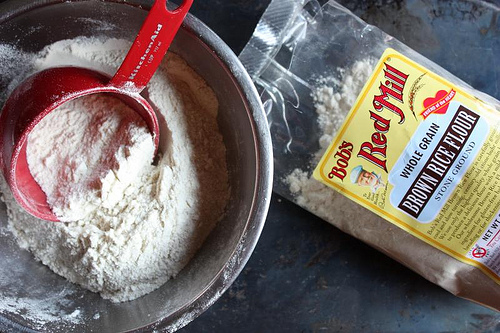You’ve probably familiar with the Gluten-Free diet. It is popular among health nuts and is necessary for those diagnosed with Celiac disease, a disease in which the small intestine is hypersensitive to gluten. You don’t have to have a gluten allergy to reap the benefits of a gluten-free diet. Here is a list of some of the best budget-friendly gluten-free flours.
Rice Flour — $3.59

Rice flour is a popular alternative for those who are allergic to gluten. Brown rice flour, in particular, yield many health benefits and is rich in nutrients like vitamin B1, B6, manganese, and iron. Additionally, it has 1 cup has 7 grams of dietary fiber, which means that it is easy to digest. Therefore, when choosing a rice flour, stick with brown rice flour. The reason being is that when brown rice is converted to white rice flour almost half of its nutrients are destroyed. Therefore, brown rice flour is the way to go.
Tapioca Flour — $3.29

Although it is less nutrient-rich than brown rice flour, tapioca flour is another great low-calorie gluten-free option. It is derived from cassava roots and is then bleached and refined. One cup contains only 100 calories and is sugar-free. Since tapioca flour is highly absorbent, It is usually used as a thickening agent for foods like pizza dough and pudding. If you’re clueless on how to cook using tapioca flour, try this recipe for gluten-free cheese buns.
Cassava Flour — $9.49

Cassava flour is made by drying and grating the cassava root–similar to the production of tapioca flour. However, the difference between these two gluten-free flours is that cassava flour is packed with nutrients, including 9.6 milligrams vitamin C–that’s 71% of your recommended daily dose. If that wasn’t enough to make you run to the store to purchase a bag of cassava flour, check this recipe for cassava flour strawberry crepes.
Almond Flour — $7.98

Having all of the health benefits as whole almonds, almond flour is a smart gluten-free flour choice. It contains calcium, magnesium, copper, manganese, and potassium. In addition to being packed with nutrients, a study published in Nutrient Reviews proved the connection between almond consumption and the decrease in “bad cholesterol”. Almond flour makes a great substitute for gluten flour and can even be used to coat chicken tenders. If you don’t feel like purchasing a bag of almond flour, there’s a genius tutorial on how you can make your own for cheaper.
Oat Flour — $2.99

If you want the cheapest gluten-free flour with the best value, then oat flour is a wise choice. It has the same health benefits as a bowl of oatmeal. Oat flour helps keep you fuller longer, lowers cholesterol, and improves immunity. You’re not limited to using oat flour for oatmeal cookies. You can use it to make filling gluten-free oat waffles.
Coconut Flour — $3.99

This is another white and wheat flour alternative. The great thing about coconut flour is that it is loaded with healthy fats and fiber. 1/4 cup of coconut flour contains 13 grams of fiber. A study published in the British Nutrition Journal showed that consuming food containing coconut flour helps lower and stabilize blood sugar. Enjoy the benefits of coconut flour with this recipe for low carb vegan coconut cookies.
Chickpea Flour — $2.69

Chickpeas flour, also known as besan or garbanzo bean flour, is abundant in vitamins like magnesium, B vitamins, and folate. This is especially beneficial to pregnant women considering that folate plays a key role in reducing the risk of birth defects. Like the other flour in this list, chickpea flour can be used in an array of baked goods including chocolate gluten-free muffins.
Sprouted Corn Flour –$3.02

Sprouted corn flour is another popular gluten-free alternative. Many get regular corn flour and sprouted corn flour confused and use the terms interchangeably. However, with sprouted corn flour phytic acid is removed from the grain. Phytic acid is what binds the minerals and prevents your body from absorbing them. Therefore, with sprouted corn flour, you are able to absorb and digest the vitamins and minerals. It is not only used to make buttery cornbread muffins, you can also craft a delicious corn flour butter cake.
Buckwheat Flour — $5.09

While the name is misleading, buckwheat flour does not contain wheat. Buckwheat is considered a superfood because it is packed with antioxidants and vitamins like folate, magnesium, zinc, and iron. Eating buckwheat is even associated with improved digestion. To reap its benefits, try out this recipe for buckwheat pancakes.
Teff Flour — $7.29

Teff is deemed as the world’s smallest grain and produces a flour substitute that is high in phosphorus, iron, calcium, B vitamins. To add, Teff flour improves circulation and boosts your immune system.
